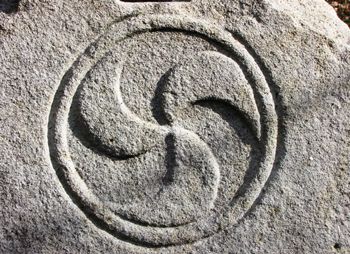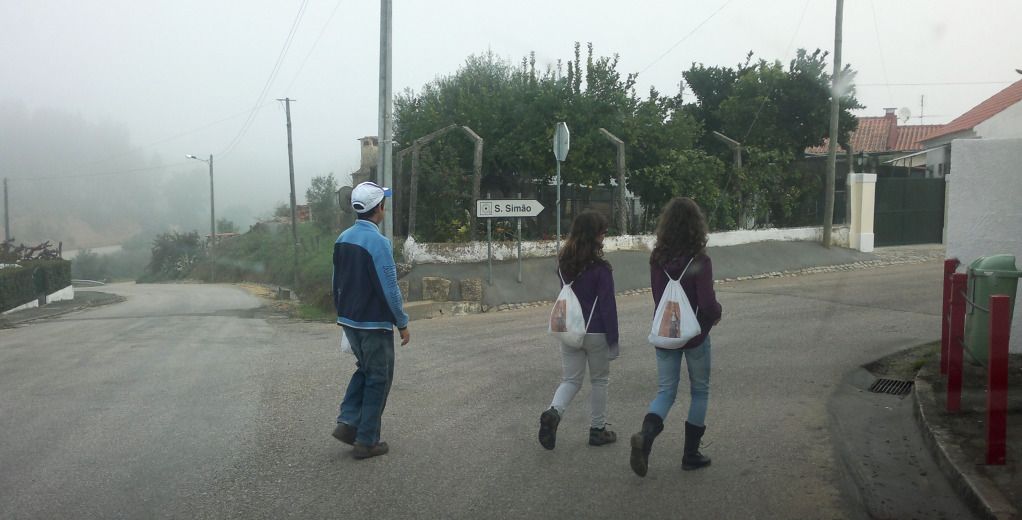Catrau
Pagan Portugal
by , 12-27-2012 at 09:46 PM (11611 Views)
The All Saints day was established as a Christian festival in 609 or 610 by Pope Boniface IV [1]. The Christian tradition tends to smother and obliterate the root of all these pagan traditions as old as time and sourced from our Indo-European cultural matrix.
Yesterday, when driving on a highway in the province of Salamanca, heard on a local radio Salmantina, therefore from a land of great religious Christian fervor, a brief note about this pagan tradition. Nothing that I did not already knew but the truth is that around here we seem to have qualms about speaking in pagan culture that, despite intense romanization that brought us many good things such as law, organization and communication routes, also resulted in a large misappropriation of indigenous traditions as cults and language. For some reason our forefathers fought to the death against the Romans.
Our traditions further afield this time of year talk about partying and the dead-end cycle of crops that had begun with the sowing of spring. It was also the time when the cattle were collected from summer pastures and slaughtered to provide meat coat and for the winter [2]. This festival ended the enjoyable life and the great labor of summer and most of the spring and autumn. The men and women drunk a beer then fabricated [3] [4]. Note that in this Celtic or celtizied society, the women had as much importance as men at work and in war [4]. These ancestral rhythms and traditions are typical of many peoples but since the 1st millennium before our era, in Atlantic Europe in general and in particular in the lands where we live today and that we call Portugal, Galicia, Asturias, Cantabria and Leon [5]. These festivals are known and described as Samhain in early Irish literature [6]. What we have to do with Ireland? It is that today it is known by genetic marking that despite having passed by here many people, they were nothing but drops of coffee in a cup of milk and that we are basically what we were already 3000 years ago [7] [8]. Moreover, it is known that Ireland and the south of England, among other important migrations, were also occupied by the Celts of Iberia [9] precisely as described in the Lebor Gabála Érenn (Book of Invasions of Ireland) [10] and the legend of Breogan, the Celtic King of the northwest that gave its name to Brigantia (A Coruña) and Bragança. Some of the traditions of this time of the year were brought there, others were already there and also came from central Europe, therefore, say that Haloween is an Anglo-Saxon tradition is not correct, it is a Celtic tradition still well rooted among us in Tras-os-Montes but not called that way. The Transmontanos know how to preserve their pagan traditions as the night of witches, witchcraft, the cures based on what nature gives (reminiscent of the Druids?), The Carnival, the bull fights (not “tourada”, it’s a different thing called “Chega de bois”), the bagpipes, the pauliteiros, etc. . and they discuss them in the Vilar de Perdizes Congress, always on par with the best Christian tradition. This means that these two worlds are reconcilable and we can and must further explore this facet of our long and rich history as a people. Understand it better results in understand ourselves better to have more pride in what we are.
The triskel is the major pagan symbol for us. It's equivalent to the christian cross.
After the Roman conquest, this Celtic tradition was adapted by the Romans who named it Lemuralia, it was a festival for the dead in which they practiced rites to exorcise the evil spirits and the Vestals prepared with flour dumplings made with fresh crops that year [11]. Finally, in the seventh century, the Lemuralia lost its profane dimension and became the Day of the Dead (November 2) that today we celebrate the day of All Saints (1 November), or rather celebrated because those smart guys Lisbon and the church saw fit to eliminate the holiday corresponding to this millennia festival.
A final word about the "cookies" tradition. On the first of November in the morning, the kids knock at the doors and ask: “bolinhos, bolinhos à porta dos santinhos” it means “cockies, cockies at saints door”. Lately, I started to read (never referenced information) that this old tradition is called "Bread-for-God" and that it appeared in Lisbon in the year after the earthquake of 1775 [12]. After that year the kids spent this day knocking on doors asking for bread to remedy poverty, sang verses etc, etc, something very farfetched. For me, this is a new thing, in my land we never called it "Bread-for-God", there has always been and still is "Cookies, cookies at saints door!" There were never verses recited at the doors (its too civilized to barbaric like us), and never asked for the cookies to stave off hunger, cookies are sweet, are a delicacy. We ask for cookies because our grandparents did it before and was a way to maintain an old tradition, and they do exactly the same thing in northern Spain. I would like very much that those guys from the capital stop wanting to foist the rest of the Portuguese what they think is their traditions (Bread-for-God, fado, bullfights (touradas), moormania, etc..), We can enjoy all of these things but do not extrapolate them to the rest of the Portuguese, is a lack of respect. We are a small and uniform country but culturally rich and diverse. This Bread-for-God thing leads us immediately to think why is it that the Irish, British, Americans, Australians have exactly this same tradition of cookies? Kids will knock at the doors and ask "Trick-or-Treat?" Instead of giving them cookies give them candy; They have masques (to frighten) but not here; There do it in the afternoon of the 31st but here in the morning on day 1st. It's the same thing and was not born in Lisbon 250 years ago.
There they go: the kids with their bags after the cockies
The church does not need to rip our ancestry because it already has a very important place in our traditions and Lisbon can keep to themselves their traditions, or stop inventing them, this way they will let other Portuguese realize who they really are.
[1] Hileman, Laura, 2003. What is All Saint's Day?, The Upper Room (United Methodist Church).
[2] Manuel Velasco, 2004. Breve historia de los Celtas, Ediciones Nowtilus - Saber. ISBN: 84-9763-241-9
[3] Pedro Silva, 2006. História dos Lusitanos, Prefacio Publishing, ISBN: 989-8022-05-1
[4] John Vaz, 2009. Lusitanos - no tempo de Viriato, Ésquilo Publisher, ISBN: 978-989-8092-51-9
[5] Haywood, John, 2001. The Historical Atlas of the Celtic World, Thames & Hudson, ISBN: 978-0500051092
[6] Ross, Anne, 1981. The Celtic Consciousness: Material Culture, Myth and Folk Memory, O'Driscoll, Robert (Ed.), Braziller, New York, pp. pp.197-216: ISBN: 0-8076-1136-0
[7] Pereira, Luisa and Ribeiro, Philippa, 2009. The Genetic Portuguese heritage - The history preserved in human genes, Gradiva, ISBN: 978-989-616-326-6
[8] Cunliffe, Barry and Koch, John, 2012. Celtic from the West: Alternative Perspectives from Archaeology, Genetics, Language and Literature, Celtic Studies Publications, Oxbow Books, ISBN: 978-1842174753
[9] Koch, John, 2009. Tartessian: Celtic in the South-west at the Dawn of History, Celtic Studies Publications, ISBN: 978-1891271175
[10] Danaher, Kevin, 1981. The Celtic Consciousness: Irish Folk Tradition and the Celtic Calendar, O'Driscoll, Robert (Ed.), Braziller, New York, pp.217-242: ISBN 0-8076-1136-0
[11] Thaniel, George, 1973. Lemurs and Larvae - The ordinary appellation for the dead in late Republican and early Imperial times, pp. 182-187.
[12] - Dia de Todos-os-Santos - Pão-por-Deus, Wikipedia, http://pt.wikipedia.org/wiki/Dia_de_Todos-os-Santos on November 1, 2012.









 Email Blog Entry
Email Blog Entry

